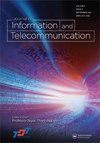基于孟加拉语症状的医院室外患者分类
IF 2.7
Q2 COMPUTER SCIENCE, INFORMATION SYSTEMS
Journal of Information and Telecommunication
Pub Date : 2023-04-09
DOI:10.1080/24751839.2023.2196106
引用次数: 0
摘要
摘要近年来,孟加拉国在各种医疗服务的数字化方面取得了显著发展。尽管已经开发了许多移动应用程序和社交平台来自动化医疗保健部门的服务,但仍有空间使这一过程顺利进行,让普通人更容易访问。本文描述了一个系统,用户可以用母语孟加拉语给出他们与健康相关的问题或症状,该系统将根据用户所陈述的症状推荐用户应该就诊的医疗专家。使用各种自然语言处理技术对数据进行处理。在这项研究中,我们应用了基于机器学习和深度学习的方法。已经应用、分析了三种不同的机器学习模型和四种深度学习模型,并评估了各种模型的准确性,以确定在给定数据集上能够提供卓越性能的最佳模型。在传统的机器学习算法库中,随机森林(RF)分类器的准确率最高,约为94.60%,卷积神经网络在深度学习模型中表现最好,准确率为94.17%。本文章由计算机程序翻译,如有差异,请以英文原文为准。
Outdoor patient classification in hospitals based on symptoms in Bengali language
ABSTRACT In recent years, Bangladesh has seen significant development in the digitalization of various healthcare services. Although many mobile applications and social platforms have been developed to automate the services of the healthcare sector, there is still scope to make the process smooth and easily accessible for general people. This paper describes a system where the users can give their health-related problems or symptoms in the native Bengali language, and the system would recommend the medical specialist the user should visit based on their stated symptoms. The data is processed using various Natural Language Processing techniques. In this study, we have applied both Machine Learning and Deep Learning-based approaches. Three different models of Machine learning and four models of deep learning have been applied, analyzed and the accuracy of various models is evaluated to determine the best one that could provide superior performance on the given dataset. From the pool of traditional machine learning algorithms, the Random Forest (RF) classifier gives the highest accuracy of about 94.60% and Convolutional Neural Network performs the best among the deep-learning models, with an accuracy of 94.17%.
求助全文
通过发布文献求助,成功后即可免费获取论文全文。
去求助
来源期刊
CiteScore
7.50
自引率
0.00%
发文量
18
审稿时长
27 weeks

 求助内容:
求助内容: 应助结果提醒方式:
应助结果提醒方式:


